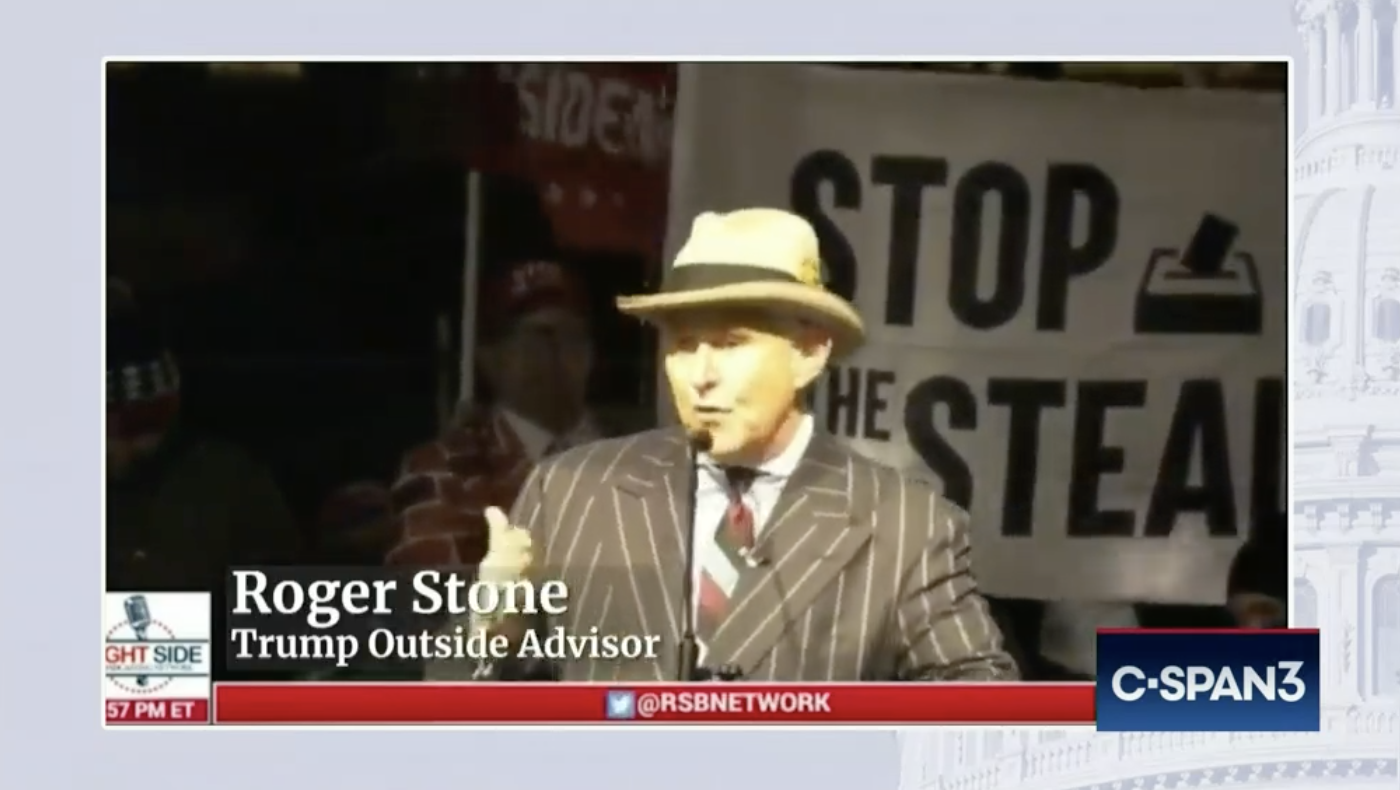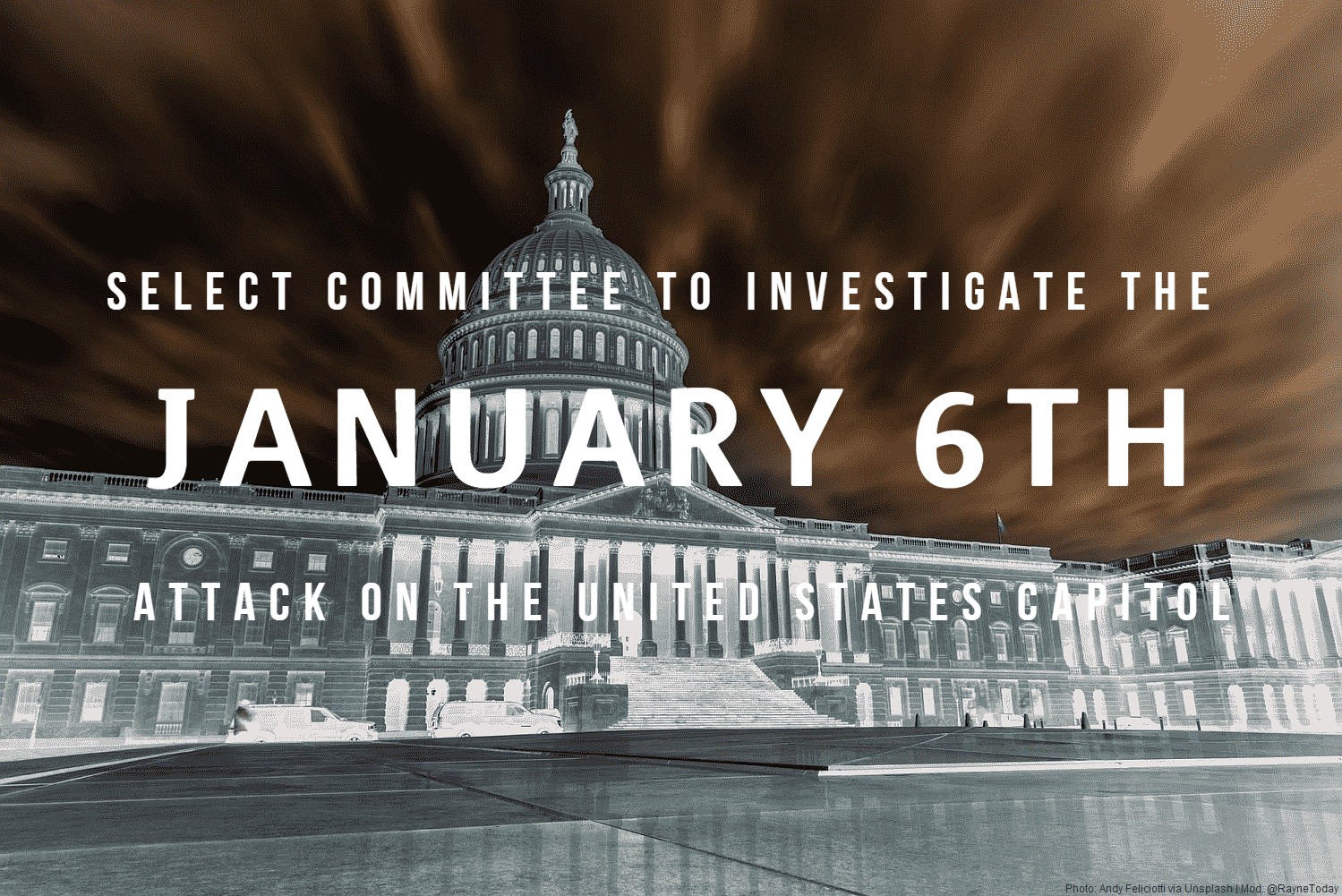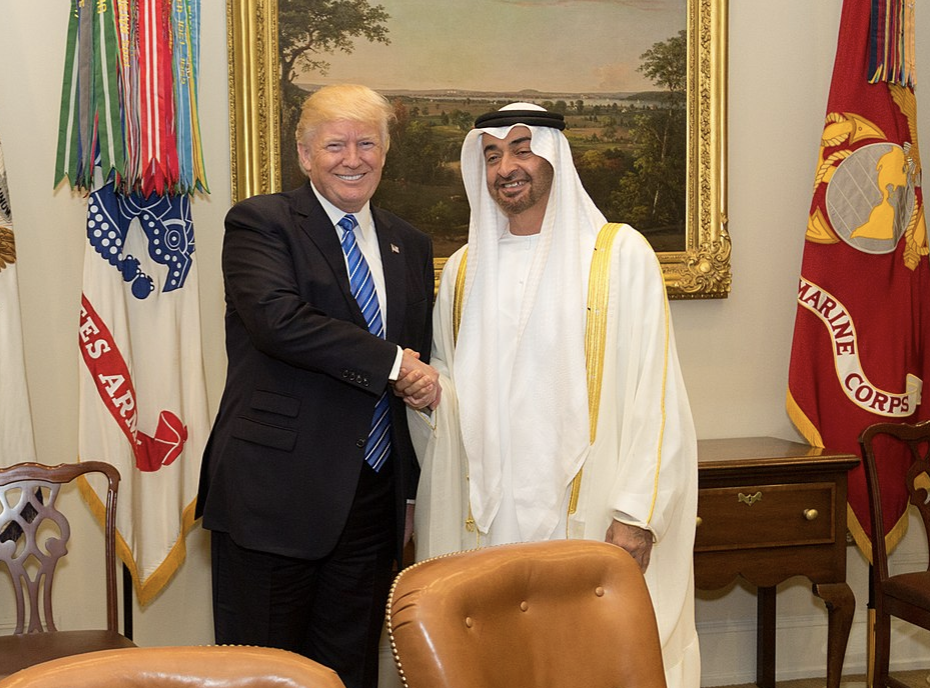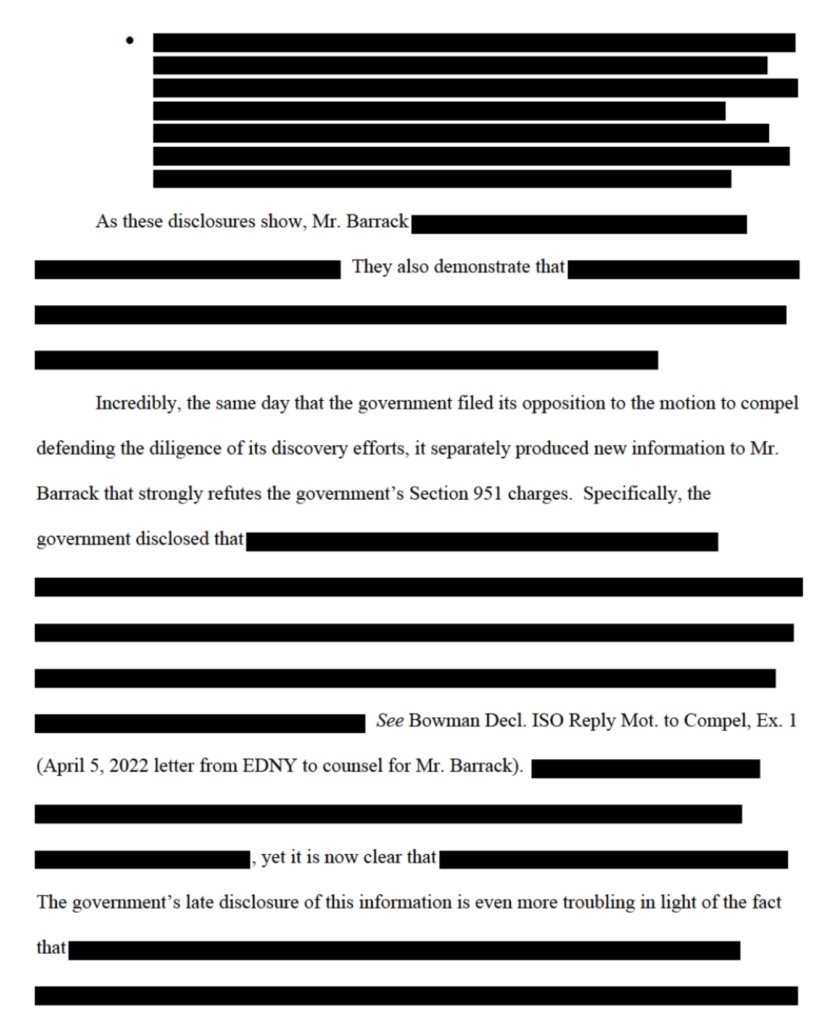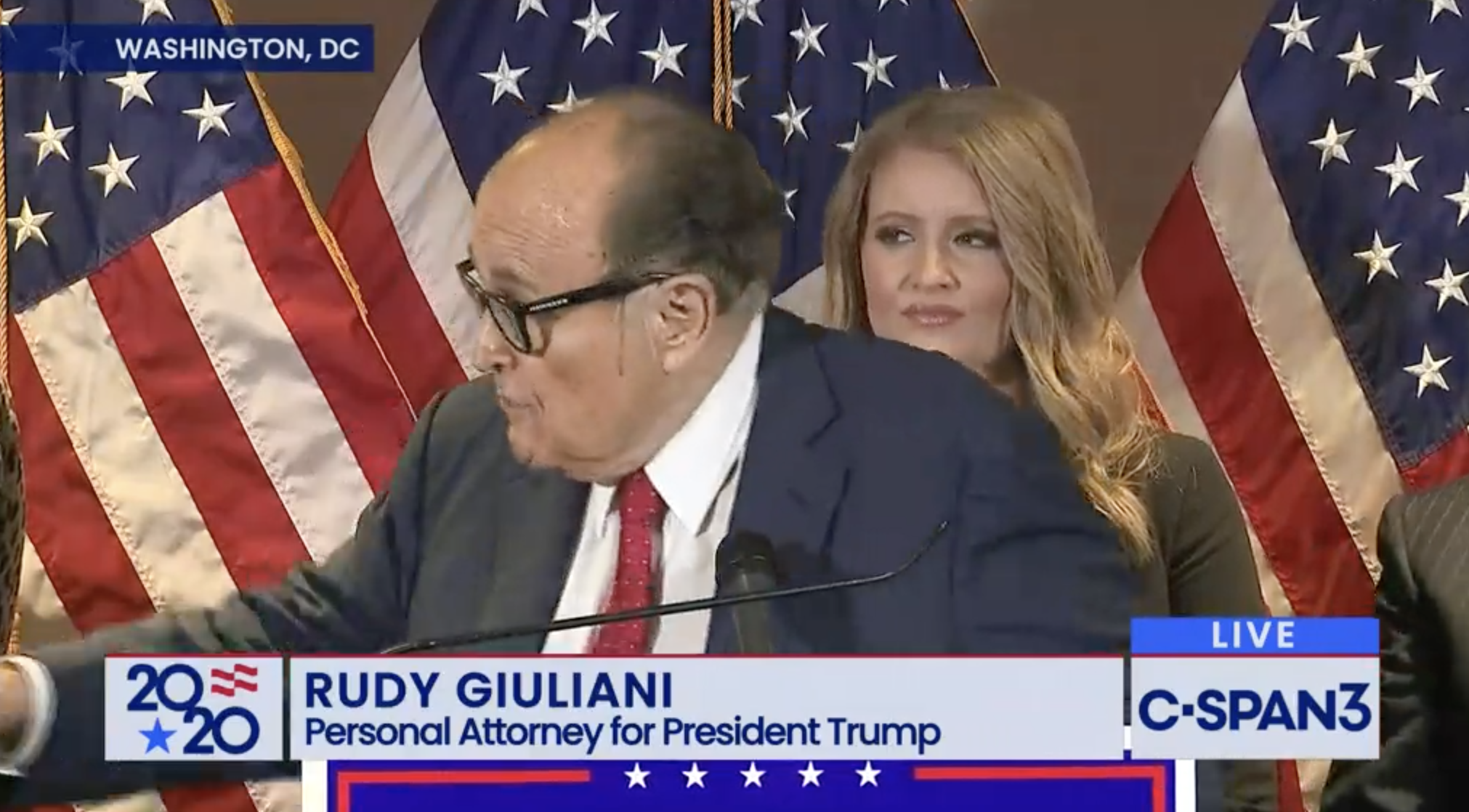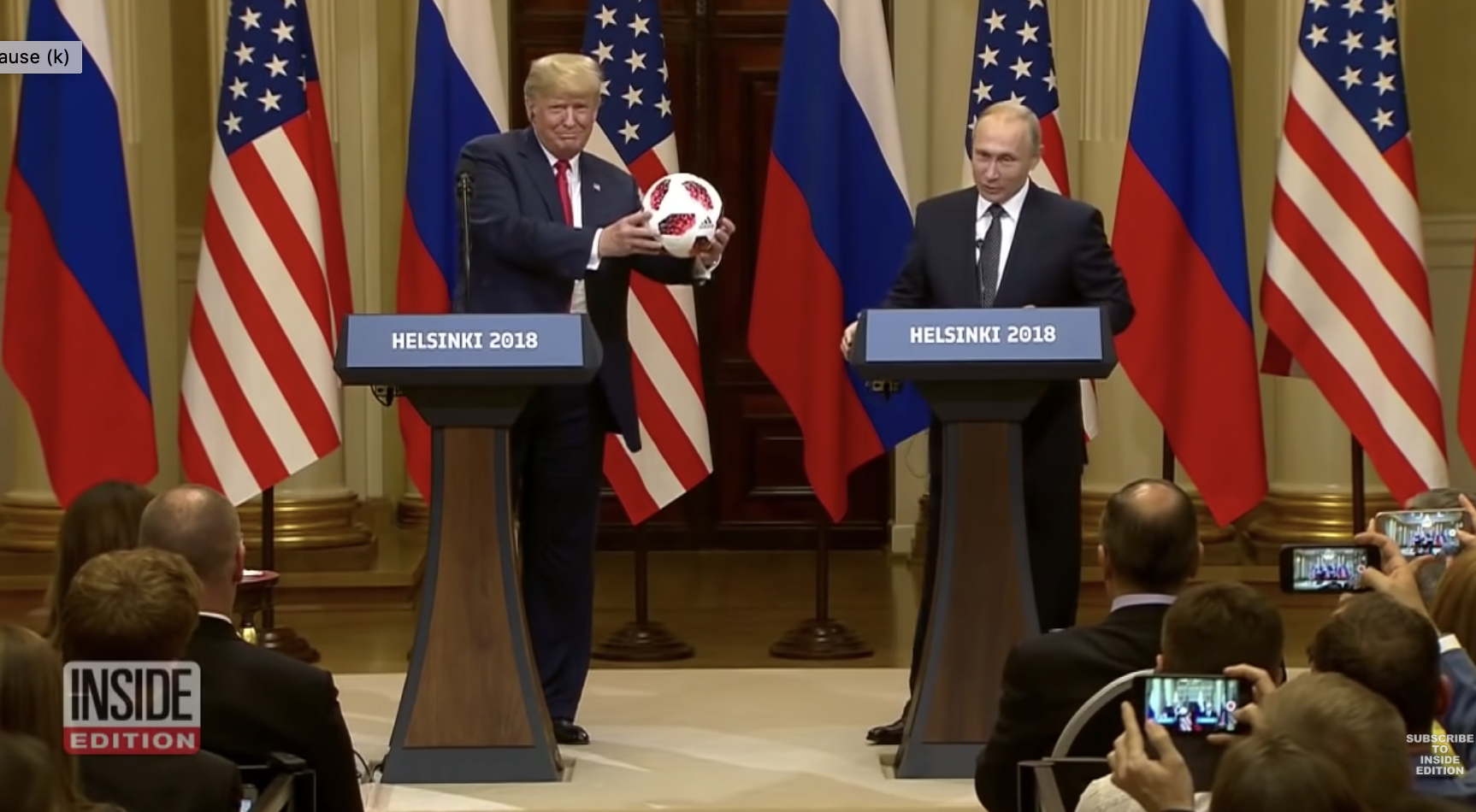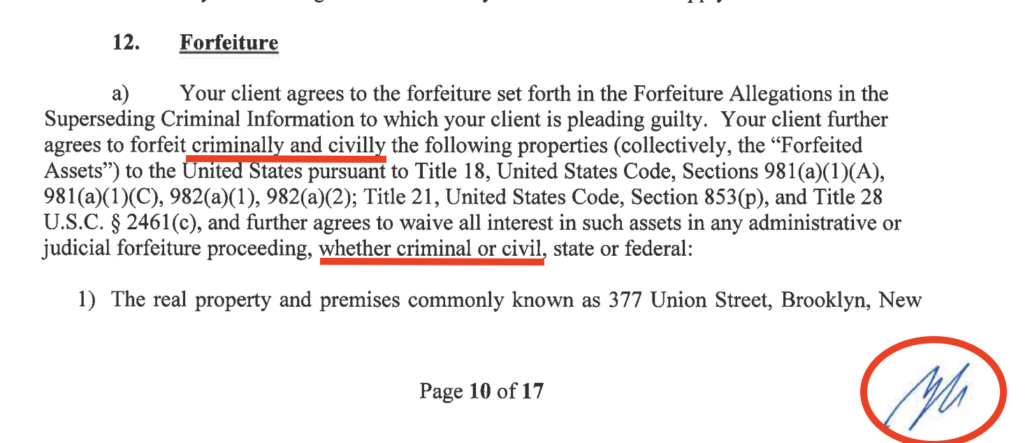There’s something almost entirely missing from the Tom Barrack indictment charging him with acting as an Emirate Agent. The money.
The indictment invokes forfeiture law, suggesting that someone profited from all of this or there’s some other loot the government wants to seize (but it lists none specifically; a memo requesting detention until a bail hearing requests that Barrack be made to identify all his financial assets to get bail).
But other than that, the sole mention of money describes that, on July 14, 2016 (months after this relationship started), Barrack pitched a “guidance board” that would tie UAE’s investments with strategic goals.
The presentation proposed the creation of a guidance board “through which all [UAE] investments are intertwined with the strategic vision of the country’s foreign and domestic policies as well as economic goals,” with the guidance board mandating “that all investments in operating companies use the resources at their disposal to influence [UAE’s interests] abroad … and partner with leading [UAE] friendly-influential figures to do so.” The presentation further proposed that the defendant THOMAS JOSEPH BARRACK work directly with Emirati Official 2 to execute the proposed strategy.
Then, months later on December 14, after Trump’s victory, this proposal assumed continued influence over Trump’s actions.
While the primary purpose of the platform [will be] to achieve outsized financial returns, it will also accomplish a secondary mandate to garner political credibility for its contributions to the policies of [Trump] … We will do so by sourcing investing, financing, operationally improving, and harvesting assets in those industries which will benefit most from a [Trump] Presidency.”
This suggests that Barrack and Colony Capital would be expected to direct UAE’s Sovereign Funds in such a way as to implement their policy goals. A 2018 NYT story described how Barrack’s investment firm raised $7 billion in the time after Trump got the nomination, almost a quarter of it from Saudi and Emirate sources — but none of that appears in the indictment.
Mr. Barrack’s company, known as Colony NorthStar since a merger last year, has raised more than $7 billion in investments since Mr. Trump won the nomination, and 24 percent of that money has come from the Persian Gulf — all from either the U.A.E. or Saudi Arabia, according to an executive familiar with the figures.
These financial relationships will face a great deal of scrutiny as this case goes forward because a Foreign Agent cannot be someone “engaged in a legal commercial transaction.” One defense Barrack might try to make is that this was all about obtaining customers for his investment fund. But if no money changed hands, Barrack might suggest he sincerely believed in the import of fostering better ties between the Emirates and the US.
A Foreign Agent, not a lobbyist
Contrary to what you might have read, this is not a FARA case, which is generally treated as a regulation covering certain kinds of lobbying for foreign (including non-governmental, like the political party Paul Manafort hid his work for) entities. Barrack was charged under 18 USC 951, which is about working for a foreign government directly. The statute is sometimes referred to as Espionage Lite, and in this case, the government might believe at least some of the people involved — perhaps Al Malik, who fled the country days after the FBI interviewed him in April 2018 — are spies. By charging 951, though, the government only has to show that the team was ultimately working on orders from government officials without registering, not that someone was secretly reporting to another country’s spying agencies.
And this is pretty clearly about a relationship directly with UAE. In addition to Barrack and his employee Matthew Grimes, the indictment describes a chain of command in which several senior Emirati officials convey requests through Rashid Sultan Rashid Al Malik Alshahhi (referred to as Alshahhi in the indictment and as Al Malik here and elsewhere) to Barrack. On the Emirati side, Emirati Official 1 (EO1), is described as someone who, “held a high-ranking position in its armed forces,” but who, given events described in the indictment, must be Abu Dhabi’s Crown Prince Mohamed bin Zayed. Emirati Official 2 (EO2) is described as a “high-ranking official with responsibilities related to national security,” but appears to be National Security Advisor Tahnoun Bin Zayed. Emirati Official 3 (EO3) is described as a member of UAE’s National Security Council. Their orders often get delivered to Al Malik through Emirati Official 4 (EO4), who is described as a government official who reports to EO 2 and EO3. There’s also a diplomat, Emirati Official 5, who asked Barrack to provide insight into the top national security appointments Trump was planning. Basically, this amounts to MbZ tasking EO4 to instruct Al Malik to provide instructions in turn to Barrack. This structure is important, because it demonstrates that Barrack was being directed directly by the UAE government and, starting in October 2016, directly by MbZ himself.
A secret agent hiding the direct orders he was following
Aside from this reporting structure, two things will help the government make the case that Barrack was working as an Agent of UAE. Officials from the Emirates explicitly said that they wanted to use Barrack to represent their policy interests in the US rather than relying on their ambassador. For example, EO2 explains why he prefers to work through Barrack than UAE’s ambassador because he, “knows ambassadors can’t do much and they are limited even if they’re active.” After Barrack started doing TV appearances where he pitched the UAE, Al Malik told him that EO1 had said, “you are the new trusted friend!” And after Grimes submitted a Barrack op-ed for advance review by Emirate officials, Al Malik responded that, “Big boss loved it.” Then after the op-ed came out (having had a reference to dictatorships that the Emiratis found objectionable removed), Barrack asked through Al Malik “how Boss liked the article?” The indictment further describes how, in December, the Emirates directed Barrack and Grimes to put together a set of plans — “100 days/6 months/year/4 years” — of what they wanted to accomplish along with the Saudis; on that plan Barrack, Al Malik affirmed in Arabic, would “be with the Arabs.” Then, when Al Malik wrote Grimes and suggested the US should list the Muslim Brotherhood as a Foreign Terrorist Organization, Grimes responded, “At your direction.” This is the language of clear direction, channeled right from the top of the UAE government.
And while not required (remember that Maria Butina didn’t really hide what she was up to or even her ties to Aleksander Torshin), the indictment describes several ways that those involved tried to keep this relationship secret. As Barrack shared a Trump speech in advance, he described that it was “Totally Confidential.” In September, just as Barrack would start dealing directly with MbZ and two days before he’d call out MbZ in a Bloomberg interview, the go-betweens instructed Barrack to download the encrypted messaging app that MbZ uses. Barrack seems to have gotten a text directly from MbZ on September 29. And then in October, Grimes arranged to get both Barrack and himself dedicated phones to use to communicate with MbZ and others via the encrypted app.
While not included in the indictment, the detention memo also describes that Barrack downplayed his ties with Al Malik in a filing to the State Department.
Indeed, in June 2017, the defendant completed and submitted paperwork to the U.S. Department of State in connection with his efforts to secure an official position in the Administration. In his submissions, the defendant materially misrepresented his connection to Al Malik, falsely claiming to have had only infrequent contact with Al Malik and further claiming that he did not know Al Malik’s citizenship or whether Al Malik was affiliated with a foreign government, despite describing Al Malik in private communications as the UAE’s “secret weapon.” Further, in his submissions to the U.S. Department of State, the defendant was required to report any occasions when he had been asked to provide advice, serve as a consultant, even informally, or otherwise work on behalf of a foreign government. The defendant failed to disclose his extensive activities on behalf of the UAE.
It’s partly all this secrecy that will help the government prove their case.
But the way the government uses additional charges to show that Barrack tried to hide all this will help. In addition to 951 and Conspiracy to violate 951 charges (the latter of which was likely included because it’s easier to prove and to provide defendants, particularly Grimes, with a charge that has less onerous penalties to plead to), the government charged Barrack with obstruction of justice and four counts of false statements for attempting to lie about this. In a June 20, 2019 interview with the FBI, the indictment alleges that Barrack lied about whether:
- Al Malik asked Barrack to do things for UAE
- Barrack downloaded an encrypted app to use to communicate with MbZ and other Emirati officials
- Barrack set up a meeting between MbZ and Trump and, generally, whether he had a role in facilitating communications between them
- He had a role in prepping MbZ for a September 2017 meeting with Trump
Curiously, the detention memo mentions two more lies that aren’t included in the indictment:
(1) writing a draft of a speech to be delivered by the Candidate in May 2016; (2) reviewing a PowerPoint presentation to be delivered to senior UAE officials on how to increase the UAE’s influence in the United States with his assistance;
In any case, this structure makes it easy to hold Barrack accountable at least via his lies to the FBI, and that he allegedly lied is powerful evidence that the full scope of the relationship was meant to be secret.
The key Trump world figures and the black box White House
Over coming days, we’ll learn who all the Trump officials named in the indictment are, but a key, unstated part of it all is Barrack’s success at placing Paul Manafort on Trump’s campaign. The indictment dates Barrack’s role as an “informal” advisor to Trump’s campaign to “approximately April 2016,” one month after Barrack had a key role in installing Manafort on Trump’s campaign. It describes how Al Malik set up a meeting on April 24, in advance of which Barrack boasted that he had a 30-year relationship with Trump and had “staffed the Campaign.” After a meeting in the Emirates, EO 4 confirmed to Alshahhi that Barrack would be “the only channel” to Trump for UAE. Days later, Barrack sent Alshahhi a draft Trump energy speech and asked for feedback. Ultimately, Barrack succeeded in getting a promise to “work with our Gulf allies” into a May 26 Trump speech.
It’s not really clear with whom Barrack was working on the campaign. The indictment describes that “a senior member of the Campaign” emailed Barrack with a revision of the Energy speech, in response to which, Barrack instructed the “senior member” that they needed “one paragraph to balance foreign-policy concerns for energy dependent allies in the gulf.” ¶22 It’s likely that this is either Manafort himself (who had not yet fully pushed out Corey Lewandowski but was well on his way) or Rick Gates, the latter of whom played a similar role when Roger Stone wanted to script Trump’s foreign policy statements at that stage of the campaign.
Barrack’s role as Chair of Trump’s Inauguration Committee is minimal to the crimes in this indictment (meaning double jeopardy would not prevent him from being charged in that, too). But one paragraph does describe how Barrack agreed when Al Malik offered to “take care of ME side” of the the Inauguration. And the indictment describes that when Al Malik attended the Inauguration, he did so as Barrack’s personal guest.
Similarly, there’s no mention of December and January meetings involving Jared Kushner and others, even though the December 12, 2016 meeting happened right after Barrack was in UAE on December 2.
One thing the indictment may have tried to do is insulate the indictment from any Executive Privilege concerns. Its narrative stops at the White House door. The indictment describes Al Malik asking Grimes to get the Administration to list the Muslim Brotherhood as an FTO and describes a public report shortly thereafter describing that it was under consideration, but it doesn’t describe who or even whether Barrack talked to to make that happen. It describes that Al Malik asked Grimes to set up a phone call between MbZ and Trump, describes Grimes observing that it got set up “right after I spoke to [Barrack] about it,” and quotes Grimes saying, “We can take credit for phone call.” But the overt acts of the indictment don’t actually say whether they deserved credit, or whether someone else had picked up the influence racket. The government must know he did, because they charge him for lying about setting up this meeting but it, by itself, is not an overt act. The day after MbZ met with Trump, Barrack wrote Al Malik describing that he had “lots of info on [the White House] meeting!” without describing Barrack’s source for that information. In an exception that proves the rule, the indictment describes how, as part of an effort to kill plans for a meeting at Camp David to mediate tensions in the Gulf, Barrack left a message with Trump’s Executive Assistant saying he had “something very important to share [using an ellipsis rather than naming Trump or anyone else] about the Middle East,” followed by Al Malik, two days later, offering “very special thanks and appreciations from the big guy.”
In other words, even though two of the charged lies pertain to Barrack’s role in shaping US policy in events that directly involved Trump, and even though comments suggest Barrack successfully interceded, the White House is treated as a black box; no discussions within the White House or between Barrack and Trump appear in the indictment, but they are implied in many places.
Where this came from where it will go
This investigation started well before 2018, because that’s when Al Malik fled the country just days after an FBI interview. That means it could have been a referral from the Mueller investigation (though given that Barrack lives in Los Angeles, it’s not clear why Mueller would have referred it to EDNY rather than CDCA). DOJ conducted other investigations into UAE’s foreign influence peddling there (as well as some investigations into Jared), so it’s possible this arose out of those investigations.
One thing that’s curiously missing from this indictment, though (along with references to the December 2016 or January 2017 meetings) is any reference to George Nader, who also was operating on instructions direct from MbZ and who provided extensive grand jury testimony as part of that investigation. When Nader tried to obtain a copy of his grand jury transcript as part of his defense in other influence peddling crimes in November 2019, it was revealed there were still multiple ongoing investigations referenced in it. There’s good reason to believe that Nader was not entirely forthcoming with Mueller though, in which case DOJ may not want to invoke him at all.
It’s equally interesting where this might go, which is part of the reason I find the different treatment of Candidate Trump from President Trump in the indictment really notable. This is an investigation that Billy Barr didn’t kill and that survived any pardon attempt, which suggests that Barr and Trump didn’t entirely kill all investigations implicating Trump (though the Rudy Giuliani investigation already showed that). But there are a number of things — most notably, the Inauguration — that might be implicated here but really isn’t part of the indictment.
Merrick Garland’s DOJ is not shying away from crimes that directly implicate Donald Trump. But the way they treated the White House as a black box in this indictment suggests significant deference to things Trump did while President.
Update: This Intercept story from June 2019 strongly suggests that this Barrack investigation arose out of the Mueller investigation.
Al-Malik’s name later surfaced in connection with a federal probe into potential illegal donations to Trump’s inaugural fund and a pro-Trump Super PAC by Middle Eastern donors. Al-Malik was interviewed by members of special counsel Robert Mueller’s team and was “cooperating” with prosecutors, his lawyer told The Intercept last year. The New York Times recently reported that investigators are looking into “whether Mr. al-Malik was part of an illegal influence scheme,” although no details of that potential scheme have been made public.
In fact, the U.S. intelligence community has concluded that al-Malik served as a paid intelligence source for the UAE throughout 2017, The Intercept has learned.
[snip]
After he was interviewed as part of the Mueller investigation, al-Malik left Los Angeles, where he’d been based for several years, and went back to the UAE.
And the story describes Al Malik’s handler as the Director of UAE’s National Intelligence Service, Ali al-Shamsi.
Among the Emirati government officials overseeing al-Malik was Ali al-Shamsi, director of the Emirati National Intelligence Service, according to The Intercept’s sources. A source who knows al-Shamsi described him as “more than just a spy. He’s also a discreet messenger” for Mohammed bin Zayed, known as MBZ, and his brother Tahnoun bin Zayed, the UAE’s national security adviser.
This description is perfectly consistent with the description of EO 4 from the indictment.

